You’ve made it to the end of the Free SEO Course!
Today’s final lesson was written out of necessity. This originally was a 5-day course, but then every industry — including SEO — seemingly went AI crazy.
It’s important that if you’re going to be playing this game, you know how to adapt accordingly.
Here’s what I’ve got to say about it:
The advent of AI has led to a seismic shift in SEO.
More and more people are now using AI tools to churn out content like never before, which has made the competition for search rankings fiercer than ever.
What’s more, Google is planning to introduce its own AI chatbot (called “Google Bard”) onto its homepage soon.
This means that not only are there more articles than ever to compete with, but soon there will also be less people clicking organic results in the first place.
The new Google homepage will soon look like this:
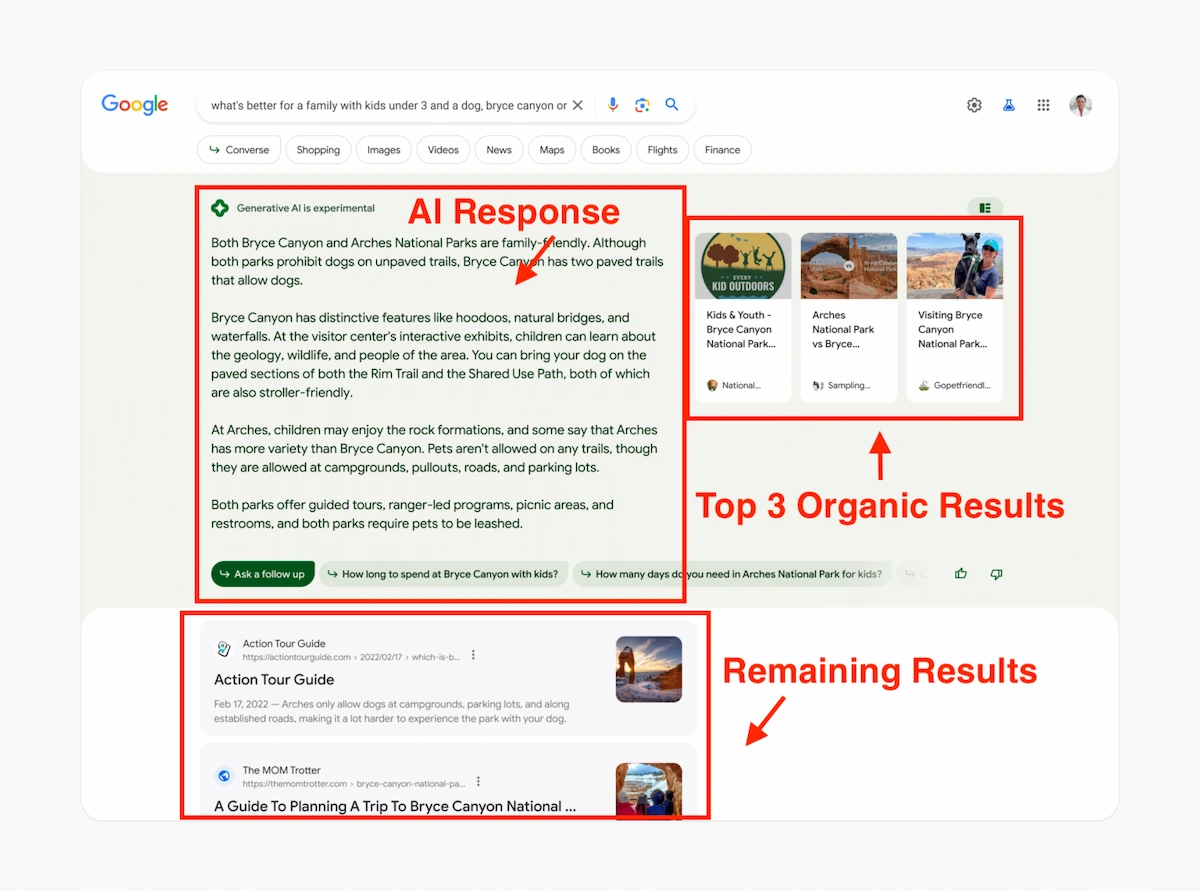
Once this gets implemented, it might sound suddenly a lot harder to drive clicks to your site, but where there’s a will, there’s a way.
AI presents a lot of good opportunities for us SEO’s as well.
In this article, we’ll explore the impact of AI on SEO, the implications of Google’s new “Search Generative Experience”, and how these changes will affect web traffic and content creation going forward.
Basically, we’ll discuss what it means for you.
Read on to learn how you can adapt your SEO strategies to handle these AI advancements, the importance of creating content that AI can not, and how to turn these challenges into legitimate opportunities for success.
An Overview of the Ongoing Changes in SEO
Firstly, let’s understand the evolving nature of SEO.
Change has always been an integral part of marketing.
Historically, SEO has consistently adapted to changes in search engine algorithms and user behavior.
SEO tactics that were once effective, such as indiscriminate link building, exact-match domain exploitation, keyword stuffing, and the blatant disregard for context or user experience, have become obsolete.
Nowadays, these practices are often flagged as spammy or manipulative by Google’s continually evolving and increasingly sophisticated algorithms.
Every single time they introduce a major change, people freak out, think the world is ending, and then learn to adapt and move on.
Such is the way of the marketer.
This time, it’s AI advancements that have led to an increasingly intricate SEO landscape.
SEO is never static. Always be ready to learn, unlearn, and relearn. Keeping up-to-date with the latest trends and changes is key to staying relevant and effective.
Quality content, user experience, and relevance now hold the center stage, rather than solely relying on keyword optimization and backlinks.
In short, assume the following two things for success:
- Google wants you to create content that your readers want to read.
- Your competitors are now using AI. To beat them, you need to make content that their AI can’t easily make.
Those who do the best job will always be the ones that are rewarded.
To rank highly, you still need to do the best job of creating the type of content that meets the needs of those who searched for it.
Understanding the Role of Keywords in the AI-Enhanced SEO Landscape
Even though AI is dramatically shaping SEO practices, it’s not pushing everything else to the sidelines.
Everything you’d learned in the previous 5 lessons of this course still very much matters.
Keywords, for instance, remain a vital component in SEO.
In this era of rapidly generated content, it’s more crucial than ever to identify the right keywords for your content to rank.
This requires understanding not just what keywords are being searched, but also the “user intent” behind these searches.
User intent simply means, if someone searches for “baseball statistics from 1999” – they’re presumably just looking for those statistics.
An article that talks about those statistics probably won’t rank, because that’s not why the person searched it.
On the flip side, if someone searched “interesting facts about baseball statistics from 1999″ — okay, maybe that article WOULD rank.
You need to put yourself in the shoes of the person doing the searching, and create the thing they are most likely wanting to find. (More on this below ????)
AI is amazing, but it can’t entirely replace the need for professional SEO tools for keyword research.
Tools like Ahrefs and SEMrush continue to be invaluable. I’ve confirmed this by asking ChatGPT for keyword data relating to the term “side hustle”.
Check out what it had to say:
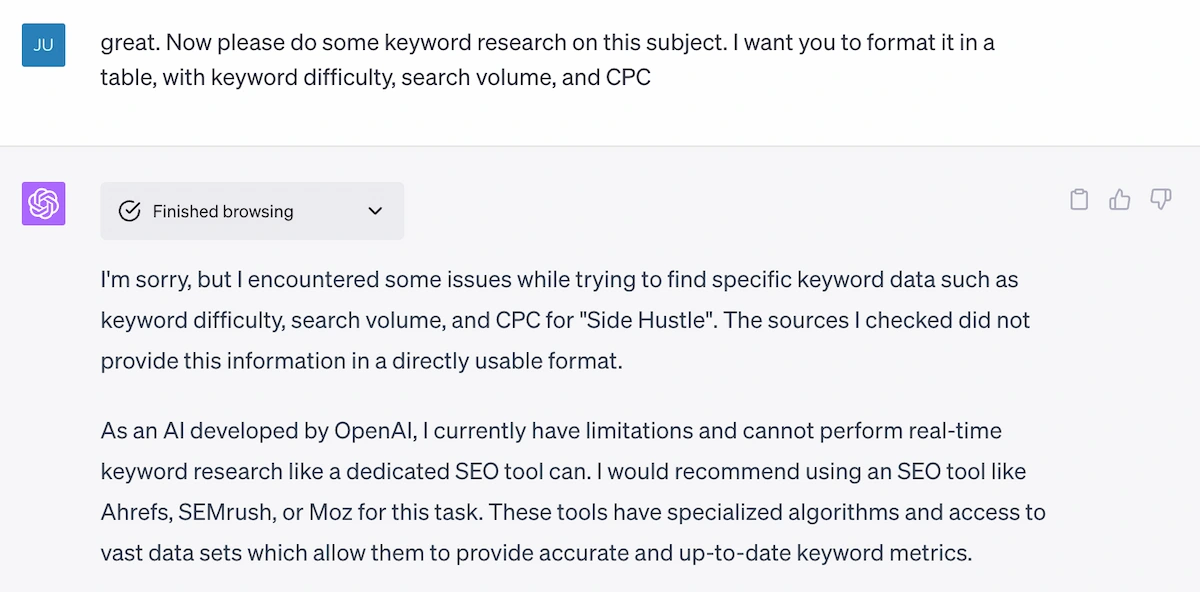
If you’re going to succeed in this game going forward, you’re going to need to know which keywords you have a chance at ranking for, now more than ever.
The Importance of User Intent in SEO Strategy
With all that said, modern SEO isn’t just about trying to target a specific keyword and writing a good article on it; it’s about comprehending the intent behind these keywords.
User intent refers to what the user hopes to accomplish with their search query, whether it’s gathering information, comparing products or services, or making a purchase.
Typically, user intent can be classified as informational, navigational, transactional, or commercial searches.
Informational searches: aim to provide answers to questions or more information about a topic, like “What is climate change?”
Navigational searches: are designed to locate a specific website or page, like “Play Wordle”.
Transactional searches: are usually performed when the user is ready to make a purchase or complete an action, such as “Casper mattress coupon code”.
Commercial searches: often mean the user is in the research phase, typically before making a transaction, like “iPhone 14 vs. Samsung Galaxy S23 reviews”.
In the AI era, creating content in sync with user intent is a cornerstone of an effective SEO strategy.
It’s about considering factors such as content format (e.g., blog post, infographic, video), information depth, and the user’s stage in the buyer’s journey.
Practical Steps to Adapt SEO Strategy to AI Advancements
To navigate the AI-altered SEO landscape, consider these practical steps:
Embrace AI Tools
They’re not perfect, but they’ll save you a lot of time when used correctly.
Instead of using ChatGPT for keyword research, consider leveraging its ability to draft SEO-optimized content outlines based on your inputs.
For example, once you’ve identified the appropriate keywords you want to target, you can feed these keywords to ChatGPT and instruct it to create a blog post outline around them.
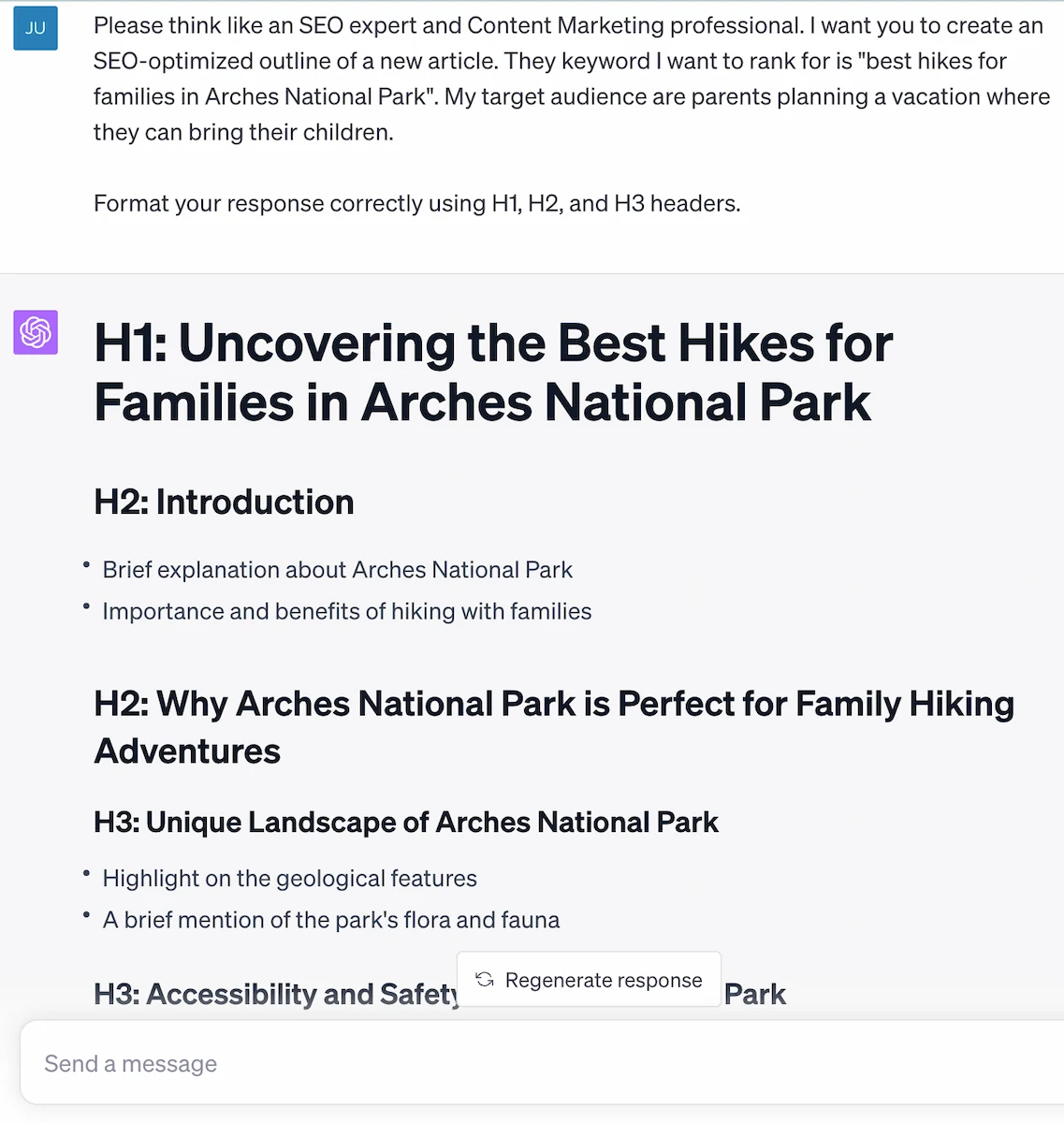
It’s important to note: the very nature of AI is that it is only creating things based on what already exists.
You will be expected, going forward, to use your brain and improve upon these.
To do this, try to think about ways to incorporate your personal perspectives and opinions throughout.
ChatGPT can provide a rough draft, extremely quickly, which you can then refine and enhance, saving significant time in content creation.
Just don’t rely on it 100%.
Create What AI Can Not
While AI is robust, it can’t mimic personal experiences. It’s hugely important to make the effort to weave your unique experiences and insights into your content.
It may take more time, but it brings authenticity to your content, a quality that AI can’t reproduce.
AI can generate content but it can’t replicate personal experiences and insights. These personal touches add authenticity and originality to your content, making it stand out.
Let’s say you are writing an article on coffee brewing. Instead of sticking to generic descriptions, you could recount your own experiences brewing coffee, the mistakes you made, the subtle nuances you discovered, or the local coffee roaster you visited.
These unique experiences humanize your content and resonate with readers in ways AI-generated content cannot.
Moreover, Google prioritizes content that provides unique insights and value to its users.
By sharing your personal experiences, you’re effectively creating original content that can’t be duplicated by AI tools, which can only draw from content that already exists on the web.
As humans, we are capable of many things that a robot is incapable of — going out and sharing our lived experiences is one of them.
This authentic, one-of-a-kind content is more likely to be recognized and rewarded by search engines, aiding your SEO efforts.
Keep User Experience (UX) Front and Center
With Google’s Core Web Vitals as a ranking factor, it’s crucial that your website delivers a positive user experience.
This doesn’t only mean faster page load speeds and mobile-friendliness but also includes website navigation, site security (HTTPS), and visual stability (avoiding unexpected layout shifts during loading).
User experience isn’t just about technical factors like page speed or mobile-friendliness.
It also includes content quality, readability, and navigability.
Always prioritize your users when designing and developing your site.
Great user experience leads to longer site visits and lower bounce rates, signaling to Google that users find your site valuable, which in turn can boost your rankings.
Opportunities Presented by AI in SEO
AI advancements offer numerous SEO opportunities. For instance, you can use AI to automate routine SEO tasks like meta description generation, for example, freeing up your time for more strategic tasks.
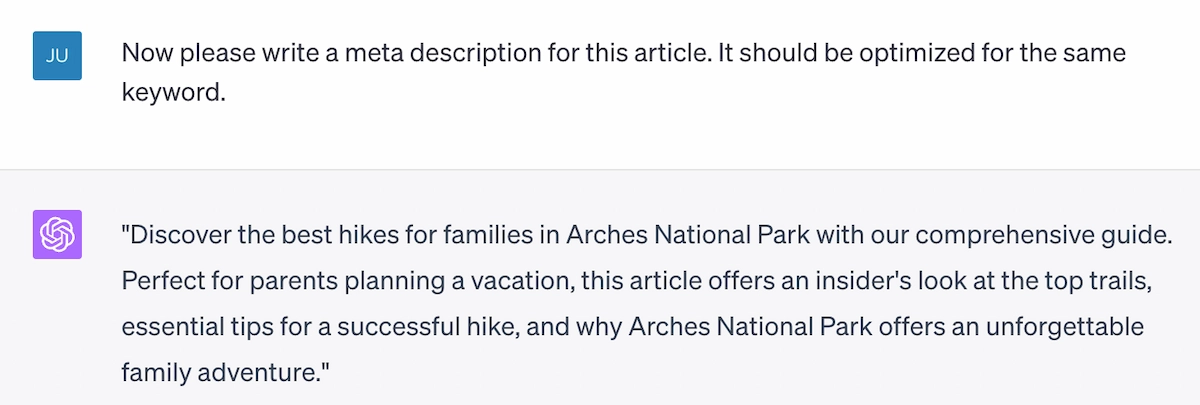
Better Semantic Keyword Understanding
Semantic keywords are keywords related to the primary keyword that help search engines understand the context of your content.
AI tools can help identify these semantic keywords to enhance content optimization.
For example, for the main keyword “chocolate cake,” semantic keywords could be “bittersweet chocolate,” “flour,” “baking powder,” etc.
You can ask ChatGPT to generate a list of semantic keywords, providing more context and depth to your content.
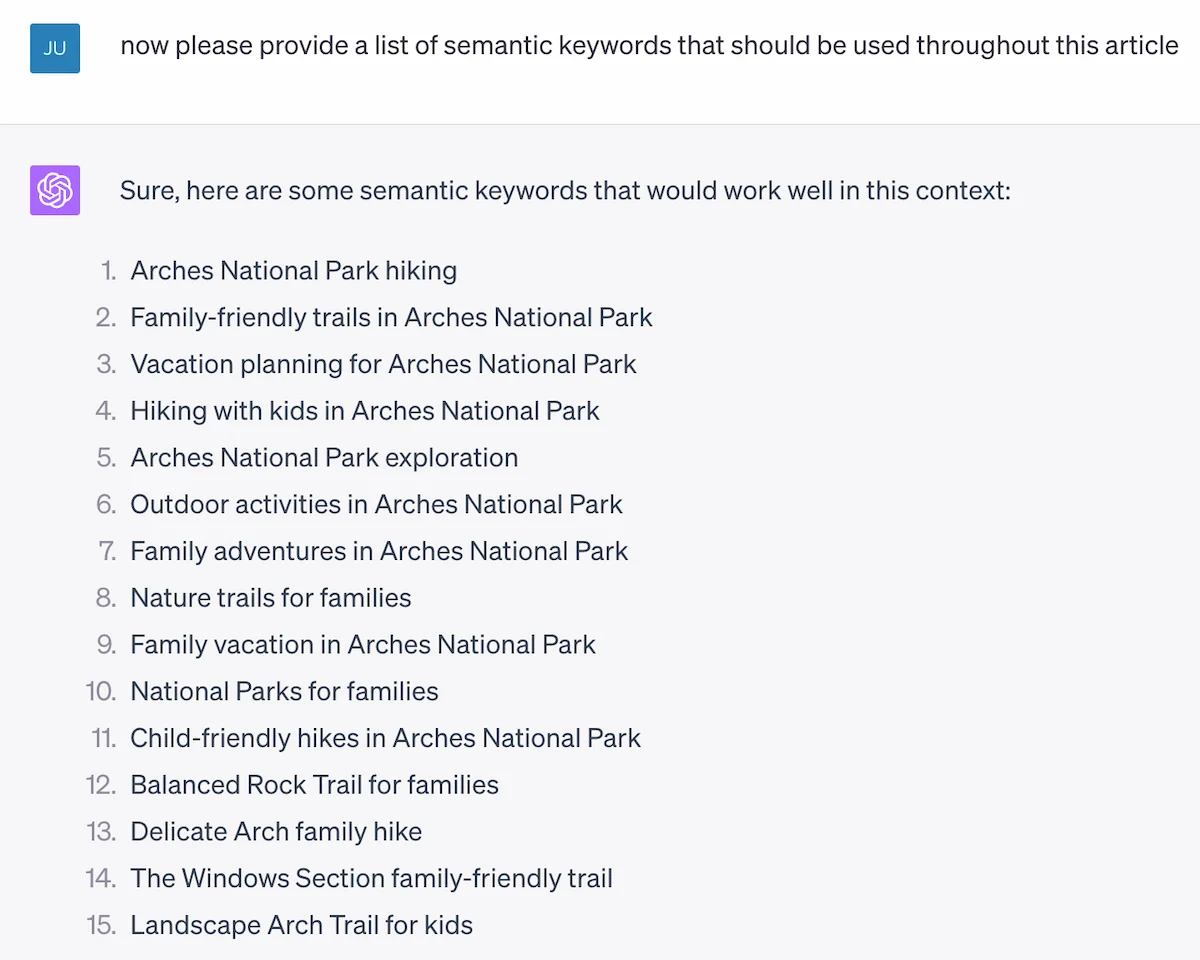
Then, once your article is written, paste it into ChatGPT and ask it to carefully place these semantic keywords throughout the article, wherever it makes the most sense, in order to give it a better chance to rank atop the results.
Improved Content Quality
AI tools can provide suggestions for readability, structure, and SEO, thereby enhancing content quality.
For instance, Grammarly can analyze your content for grammar, punctuation, and style errors, making your content more professional and easier to read.
Frase is another AI-powered tool that can significantly elevate the quality of your content. It uses AI to analyze the top-ranking content for your chosen keywords, offering you valuable insights into what these top performers are doing right.
By identifying common themes, questions answered, and even average content length, Frase helps you understand what Google deems high-quality for specific keywords.
Armed with these insights, you can create more targeted, comprehensive, and competitive content, which in turn can boost your rankings and enhance user experience.
Remember, high-quality content not only engages your readers but also makes your site more appealing to search engines.
These improvements can lead to higher rankings, a better user experience, and, you guessed it — higher placements in the search results.
Conclusion
Succeeding in SEO during the age of AI might seem daunting, but it’s far from impossible.
Remember, the goal is not to compete with AI-generated content, but to create something new, valuable, and genuinely helpful to your audience.
The way I see it? This just presents an opportunity for you to showcase your unique perspectives and expertise.
It’s what your audience wants, it’s what Google wants, and it’s what AI can’t — and will never be able to — do
Take what you’ve learned in the last 6 days of this free SEO course, apply it to your business, and hit the ground running.
I’m proud of you for making it this far.
If you have any questions at all, don’t be afraid to contact us anytime.
Thank you for giving this course so much of your time and attention.
I can’t wait to see where it takes you.
